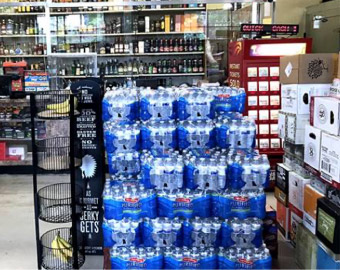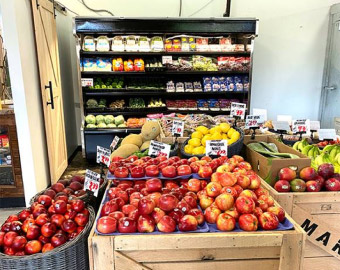The Power of Food
At the start of the pandemic, our founder and CEO Oran Hesterman wrote an op-ed in The Hill about the fragility of our supply chains, especially the one on which we all depend: Food.
Even then, there were inspiring signs of resilience, and this resilience has only grown.
Join us on a journey below as we lift up signs of resilience that show what’s possible when we harness the power of food to transform our communities for good. And if you too feel inspired by the power of food to grow community health and wealth, we hope you’ll consider supporting Fair Food Network. We couldn’t do this work without you.
[maxbutton id=”1″ ]
Healthy Food for Those Who Need It Most
Allowing one in three American families to go hungry during the COVID-19 pandemic isn’t a choice we have to make. Through pivots and innovations big or small, see how communities came together to ensure no family goes hungry.

With the unprecedented surge in SNAP enrollment, we saw usage of healthy food incentive programs like Double Up Food Bucks soar.
In our home state of Michigan…
To make the Michigan Double Up program work harder for families in need, we temporarily lifted the $20/day earning limit to provide families more food dollars. Over the year, we also brought on 26 new sites. Finally, we ramped up marketing efforts to reach families on SNAP — many for the first time in their lives — including launching a new partnership with the Detroit Lions.
And beyond.
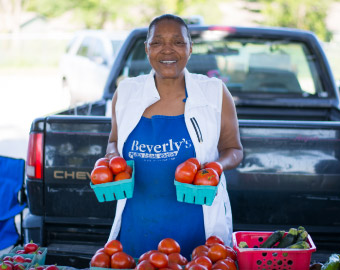
Nationwide, we grew our support of nutrition incentive programs through the Nutrition Incentive Hub, a USDA-designated coalition that launched this year in partnership with Gretchen Swanson Center for Nutrition. Fair Food Network is honored to lead technical assistance and innovation for the Nutrition Incentive Hub to a growing number of USDA-supported nutrition incentive and produce prescription projects.
As part of this work, $850,000 in grants were awarded to support capacity building and field innovations as well as pivots in response to COVID. The ideas were inspiring: From helping more farmers markets accept SNAP (or food stamps) and Double Up in rural and tribal communities in North and South Dakota to launching a mobile market delivery in rural Mississippi, groups showed continued creativity and resilience as they worked to adapt to and meet local needs.
The Essential Workers Who Made it Possible
From groceries and corner stores to farmers markets and farm stands, food businesses of all shapes and sizes stepped up and were recognized as the essential works they are. Along the way, they also demonstrated that a more resilient food system includes elements rooted in place — from farm to fork.
From farmers markets…
Deemed essential in states across the country, farmers markets quickly pivoted to keep customers safe and provide a steady market for farmers while other revenue streams dried up as a result of the pandemic. By accepting food assistance and programs like Double Up, markets also helped families experiencing hunger stretch shrinking budgets for fresh, healthy food.
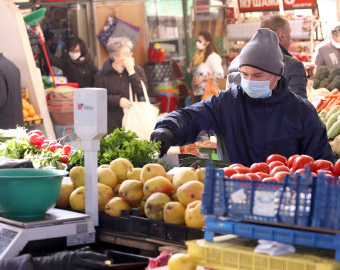
“This May, we allowed a farmer to carry an array of fresh produce at our market…the demand for fresh produce was very high and customers were taking advantage of our curbside pickup.
So although not all of his items were Michigan grown, it really helped out our SNAP customers. May was a very difficult month for everyone due to the pandemic, so for our market to offer such a large variety of items to the public was a huge success that really kept our market in the spotlight.”
— Oakland County Farmers Market
To corner stores…
In Detroit, we worked with local store Marcus Market as part of a neighborhood grocery training. This corner store had been known for grab-and-go groceries, liquor, and an in-house taco stand, but they were eager to bring in fresh produce.
The result?
Marcus Market swapped an entire section of its liquor wall with a cooler and display full of fruits and vegetables and other fresh offerings. Check out the striking before and after photos.
All while keeping farmers farming.
In all things, we work to keep local farmers front and center.
With SNAP incentives like Double Up, this includes an unwavering commitment to local sourcing across participating sites. We also elevate Michigan farmers wherever we go, as in our recent marketing campaign: Double Up Food Bucks is rooted in Michigan, and rooting for Michigan, before, during, and after COVID-19.

We’re also working hard to help more local food get to local grocers.
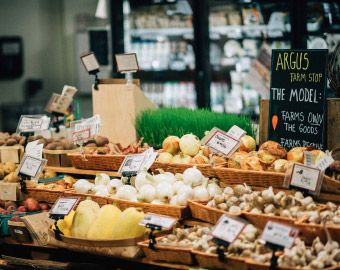 As part of our work with the Michigan Good Food Fund, we brought together 13 early-stage grocers from across the state to explore how to elevate local food in the grocery setting.
As part of our work with the Michigan Good Food Fund, we brought together 13 early-stage grocers from across the state to explore how to elevate local food in the grocery setting.
Leading the charge was Argus Farm Stop, a hybrid café-farmers market that directs 75 cents of every $1 spent on local produce back to the farmer who grew it. Since 2014, it has paid $8MM+ to 200+ food producers — all within 50 miles of its southeast Michigan headquarters. From infrastructure to culture, the Argus Farm Stop Training shared tips and tools to help aspiring grocers generate benefits from farm to fork.
Community Health and Wealth
In reflecting on the past year, one story defines resilience and the power of food to grow community health and wealth.
Quiana “Que” Broden’s eponymous Cooking with Que café and demonstration kitchen was a rising star in Detroit. From catering to team-building events, her business was anchored in her commitment to help more Detroiters “eat to live” through the introduction of nutritious plant-based meals.

When COVID-19 struck, businesses like Que’s shut down. Que, however, quickly ramped up her meal prep and delivery service, securing contracts to provide healthy food to city employees working 24/7 on the pandemic.
We were able to support Que’s hard work with business assistance and a loan. Today, not only is Que’s business on the rise, she’s helping lead her community’s recovery as her team continues to provide locally sourced, healthy food to Detroiters.
COVID-19 has illuminated how much food connects us all and is at the root of our health and wellbeing — as individuals, communities, and a nation.
At Fair Food Network, we work from farm to fork because we know food has the power to build community health and wealth, resulting in a stronger, more resilient and fair future.
Thank you for joining us on this journey.









